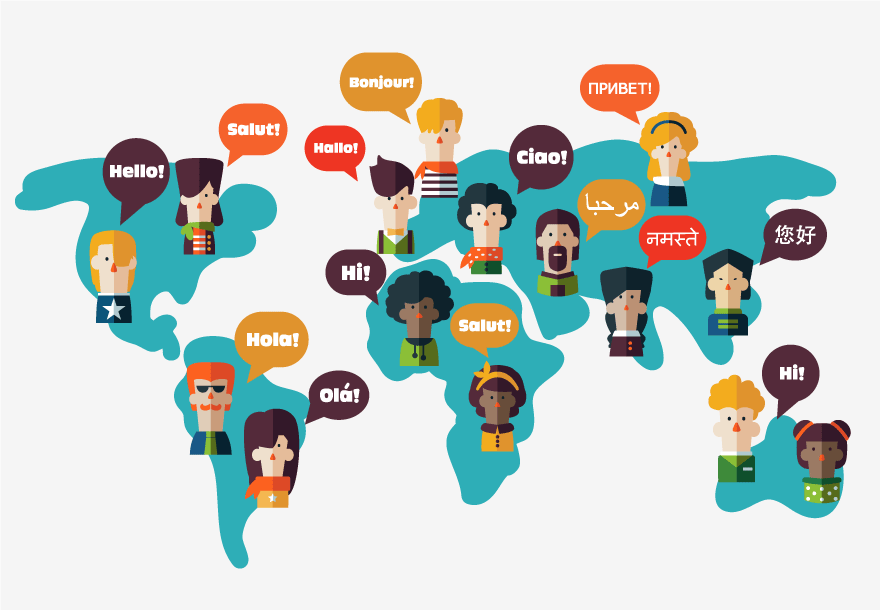Language and dialect are terms that are interchangeable. Is there a difference between language and dialect? These two words are different, even though they are used interchangeably. In this blog, we will discuss the main differences between a language and a dialect.

Language and dialect are often used synonymously when referring to the different languages spoken around the world. Although there is a clear difference between the two terms, we are sometimes shocked to hear that it is not always easy to tell them apart.
Language
An abstract system of symbols and meanings regulated by grammatical rules is what linguists refer to as a language. A language typically has two basic components: spoken language and written language. Though many languages lack a written form, this is not always the case. Some ‘dead’ or old languages no longer have any native speakers and are only preserved in written form. Speaking is the primary purpose of any language.
Dialect
A dialect can be considered a subset or ‘type’ of a particular language. A variation of a language spoken in a particular place or by a particular population is generally so characterized. Dialects are the social or geographical variants of a language that differ in vocabulary, grammar, or pronunciation. Dialects frequently differ from the language’s official or standard form. This could also be explained as a social or regional variant of a language characterized by differences in vocabulary, syntax, or pronunciation; this is particularly true of a way of speaking that diverges from the language’s standard variety.
Let us take a deep look at the major differences between a language and a dialect.
1. Language is Country Specific, While Dialect is Region Specific
The words used and understood by a community, as well as how they are pronounced and combined, are referred to as its language. Each nation has at least one official language that is employed in official correspondence and other government-related activities.
On the other hand, a dialect is characterized as a regional version of a language that is unique in terms of vocabulary, grammar, and pronunciation.
2. Language has written forms, whereas dialects mainly have oral forms
Standard grammatical rules and a wealth of literature are common in languages. They exist both as written records and as oral traditions.
Conversely, dialects are typically spoken rather than written. Even if they are written, they are typically not seen in official or government papers. Most often, the written language will be different from the spoken one.
3. The accent of language and dialect
Typically, the styles of speaking of people from different nations differ greatly from one another. However, this also frequently applies to individuals from various parts of the same nation. These variations can be so obvious that native speakers of a language can tell someone’s origins just by listening to their accent. An accent is not much related to the language, but dialects do have accents with which we can easily identify the region to which the person belongs.
In short, language is a structured, traditional system of word use that is used in spoken and written human communication. A dialect is used by a particular group of people in a particular location and differentiated by differences in vocabulary, grammar, or sound.
Language V/s. Dialect
| Language | Dialect |
| It is a method of human communication and can be either written or spoken. The words are structured and conventional. | It is a form of language that belongs to a particular region or social group. |
| It is mainly country or nation specific. | It is locality or region specific. |
| Languages are not mutually intelligible. That is, two people speaking different languages cannot understand each other. | Dialects are mutually intelligible. That is , people speaking different dialects will be able to understand each other. |
| Eg: English, French, Spanish | Eg: US English, British English |
About Henry Harvin Language Academy

The Henry Harvin Language Academy aims to upskill and develop the existing technology with language skill sets. Subject and Industrial Experts use action-oriented methods and learning solutions painstakingly designed to impart knowledge to students. These learning solutions are provided by a selected group of experts and professionals from top companies who are also appointed as subject matter experts with the academy, using our exclusive Goal focused syllabus and pedagogy.
Some of the courses offered by Henry Harvin Language Academy are:
1. Portuguese Language Course:
One of the most widely used languages in the world is Portuguese. The course seeks to develop communication, language, and translation abilities in students who wish to pursue a profession in Portuguese-speaking nations. The course also enables you to add new words, helpful phrases, and correct grammar, and pronunciation to your vocabulary. To determine Portuguese proficiency, the student must pass all six levels of the CAPLE exam.
2. Arabic Language Course:
Arabic is one of the most popularly used languages in the world. Henry Harvin offers the best coaching in Arabic through an efficient teaching method. This course gives the student a strong foundation in Arabic. It boosts the student’s language proficiency in speaking, writing, reading, and listening. Regardless of skill level, the course is appropriate for all types of students. The Arabic Language Competency Test (ALPT) is the international benchmark for assessing students’ Arabic language competency. The exam evaluates listening comprehension, reading comprehension, reading comprehension with structure, writing comprehension, and speaking.
3. 10 days Korean Language Course
The 10 days Korean language course enables one to learn grammatical concepts in just 10 days. The course will be geared towards improving learning abilities by offering instruction on everything from language proficiency to effective sentence construction. The course will guarantee that the language of Hangul is learned effectively. The certification in the Korean language makes a variety of work opportunities possible.
4. Spanish Fluency (Conversation) – Beginner-Level Course
The Spanish Fluency (Conversation) – Beginner Level Course is made to assist beginners in improving their Spanish speaking and listening abilities. The course provides interactive audio lessons, videos, flashcards, games, and other materials which enable the students to practice their pronunciation and comprehension in authentic contexts. This course includes cultural insights together with key grammar and vocabulary themes. The course is handy for participants who are working and busy because it is available online and can be accessed on mobile devices.
5. Complete English Grammar Course
This course helps to improve one’s understanding of English and develop the confidence to speak and write fluently. Get instruction in the areas of neutral accents that are understandable and clear. The course helps to choose the appropriate professional paths in the fields of literature, academia, management, public speaking, TEFL/TESOL training, and more.
6. Post Graduate Program in Italian Language
The Post Graduate Programme in Italian Language course helps to acquire in-depth knowledge of all levels (A1, A2, B1, B2, C1, C2) in accordance with Italian cultural and societal standards. The advanced degree program guarantees a good command of the Italian language, Italian literature, and Italian dialect as well as integrated & collaborative learning models and a dedication to in-depth reflective practices.
All courses offered by Henry Harvin Language Academy are live interactive sessions led by experienced trainers. The courses provide valid certification, project, and internship opportunities. There are many other language courses and wonderful opportunities waiting for interested candidates. Take a look at the Henry Harvin Language Academy which offers immense opportunities to students.
Conclusion
In conclusion, dialects and languages play a significant role in the field of sociolinguistics, which focuses on the interaction between linguistics and society. Additionally, there is some ambiguity surrounding the phrases “language” and “dialect,” making it challenging to distinguish between the two. Language refers to a standard form of communication that exists both in written and spoken form, whereas dialect is a different form of a language that is region specific.
As the world gets more globalized, the benefits of studying foreign languages are growing exponentially, and bilingualism is now arguably the most practical real-world skill ever. Learning a foreign language is all about developing the ability to interact, connect and communicate with others. In the modern world, most people are willing to go abroad and look for more opportunities to grow their careers, for which learning different languages is important, Henry Harvin provides a lot of opportunities to learn multiple foreign languages.
Recommended Reads
- German v/s Spanish: Which language to choose?
- 25 Handy languages for travelers: learn them before taking off.
- 10 Best Books to Teach English as a foreign language
- Learn a language in 10 days challenge: Two Approaches
- Top 13 Russian Language Courses in India
FAQs
A. A language is a standard form of human communication consisting of words, and grammar, both in written as well as spoken forms.
A. Language and dialect are used interchangeably, but there is a slight difference between the two. A language is a standard form of a country, but a dialect is a different form of a language belonging to a specific region.
A. It enables a person to visit different countries and communicate with the people there. It also helps with career growth.
A. Yes, Henry Harvin provides accredited, valid certification that is globally acceptable.
A. Learning different languages is actually not expensive; you must have the desire and motivation to learn and carefully select the mode of learning.
















